Search results
10 results found.
 MarkFord.net
MarkFord.net
The open-for-inspection half-way home for my writing…
10 results found.

Business, Sports… and Defending the Apostrophe
I ask GP what he’s been doing since he retired late last year.
“Living the dream,” he tells me. “I walk along the beach almost every morning. Once or twice a week I golf. I fill in the rest of the time with crossword puzzles, watching sports or TV or a movie. With Netflix, Hulu, Amazon, and the others, there are so many good things to watch.”
“Too many,” I say.
RS has a part-time job in a hardware store, which he likes. Having spent his life in construction, he knows a lot about building materials and tools. Sharing his wisdom with shoppers makes him feel good.
“I get that,” I say.
I ask him how he spends the rest of his time. Like GP, RS golfs, watches sports, and binge watches “true crime” series on the streaming services.
And then there’s the grandkids. GP and RS agree that time spent with the grandkids is the best. “So long as it doesn’t go more than a few hours,” they add. There’s just so much endurance an old person can muster up for toddlers.
GP and RS are old friends of mine. And they are good friends. But we struggle sometimes to have good conversations. I’ve been trying to figure out why that is.
Here’s my current theory: We grew into adulthood in an era when men were supposed to be the sole breadwinners. It wasn’t until we were in college that the women’s liberation movement kicked in. And even then, it wasn’t about men having less financial and parental responsibility, but about women exercising certain already established rights.
As we made room for women as equals in the workplace and elsewhere, we never expected that our financial responsibilities would be lessened. We would accept some responsibility for the housework and the child rearing, but our primary responsibility to our families continued to be to pay the bills. The more we earned, the better we felt about ourselves. And so, we continued to put most of our energy into our work.
One consequence of all of this was the effect it had on our conversation skills. In responding to the proverbial “What’s new?” we could talk at some length about the challenges, frustrations, and triumphs of our work. Work conversations were generally short and sympathetic, but they were interesting because of shared concerns. After that, the only commonality for most of us was professional sports. We talked about baseball or football or basketball.
For most of my life, I was satisfied with the conversations I had about work. I had plenty to talk about and was always interested in the experiences and opinions of my peers. As for sports, except for several years when I followed the Miami Heat, I had nothing to contribute to sports conversations. So they bored me. But that, as my friends always reminded me, was my problem. It was unnatural for a full-grown man to know nothing about professional sports. To my friends, though, my ignorance posed a different problem: Having nothing to say on the subject, I was, to them, a bore.
Today, almost all of my coevals are retired. That means we no longer talk about work. I am still working, but I’m acutely aware that it isn’t fair to burden my friends with stories of my business struggles. Instead, I talk about what they talk about: what we have done to replace the time we used to spend working – i.e., TV and movies and sometimes books… and the inevitable, golf.
And so, I find that some of the best conversations I have these days are with younger people, my colleagues and protégés that are still actively working. But that makes me sad, because I think that my best conversations should be with my best and oldest friends.
I’m drawing too grim of a picture here. My book club conversations are usually very good. And casual conversations with friends sometimes slip into philosophical discussions about politics, economics, and the disintegration of Western culture. Those I still enjoy. But it makes me second-guess the idea of retiring. I understand the allure of it, but I don’t want to spend the precious time that remains to me pissing away my time with trivial pursuits and then boring others by talking about it.
When we near retirement, we have several choices. One of them is between fixing on what we know or being receptive to continuous learning – narrowing our interests or opening up to more.
I read a short obituary in the WSJ about a British guy that decided to devote his retirement to “Defending the Apostrophe”:
After a career as a newspaper reporter and editor in England, John Richards took up the role of defending the apostrophe, an often-abused punctuation mark.
When he started the Apostrophe Protection Society in 2001, there were only two members, Mr. Richards and his son, Stephen. Soon, however, he had more than 250 members, and some made unsolicited cash donations. Letters and emails arrived from all over with examples of misuse of the apostrophe. Many offenders left the apostrophe out of possessive phrases where it was needed (“The last word was John’s.”) or inserted it where it should not have been (“It’s title was Exodus.”).
He recalled an incident when he saw a restaurant advertising coffee’s: “I said, very politely, to the owner, that it wasn’t needed. That it was a plural. But the man said, ‘I think it looks better with an apostrophe.’ What can you say to that?”
“He was always great fun to listen to,” a mourner said. “If you asked him what’s new, he always had another story and something interesting to say.”
As Anna Quindlen once said, “A finished person is a boring person.”
“Some people dream of success, while other people get up every morning and make it happen.” – Wayne Huizenga
Tryptic
Anna Julia asks me if I’ve seen Enrique. I tell her I saw him yesterday. We talk about how much he’s amejorando since his drunken, lawless days. I say it’s rare to see someone make such a positive and apparently lasting change in midlife. She agrees. I think but don’t say that I’m also proud of Enrique for weaning himself off my enabling charity. (I used to think of him as my bad son. That somehow made his dependence easier to accept.)
Twenty years ago, when he was 19, Enrique came to work for us as a gardener. He has a winning smile and a gentle demeanor. He is also bright. He began with just the most basic gardening skills, but as the years passed he became a very capable jack of many trades.
Impressed with his intelligence and good nature, I encouraged him to take classes in various trades offered at Fun Limon. Eventually, I put him into business repairing bicycles and motorcycles. I was optimistic about his future.
Everything was fine, except for Enrique’s drinking problem – which eventually affected his work. He was fired by the management company for coming to work drunk (and armed with a gun).
For the next several years, I would give him money and a pep talk whenever I happened to see him, and hope for the best. All that free help, like almost all free help, was useless. He could not hold a job, and became not just dependent on my largesse, but felt entitled to it.
About three years ago, for the first time, I refused his attempt to sweet talk me into another handout. But I told him that I would pay him five dollars for every day that he remained sober. At the end of two weeks, the day before we were due to go back to the US, he came to me and told me he had lived up to our deal. He looked sober, so I gave him his $70. And I told him that I’d continue the deal, but at the reduced rate of three dollars a day, until I saw him again on my next trip.
I didn’t expect him to stay sober, but he did. I gave him a part-time job working as a gardener at Fun Limon. And about a year after that, I discovered that he was back with his estranged wife and was making money on the side by fishing in the ocean in his spare time. Hopeful again, I encouraged him to turn his side hustle (as they call it today) into a real business. He did. And thereafter, every time I visited, he was at my house first thing the following morning with a basketful of mackerel, lobster, and whatever else he had caught.
I once again encouraged him to start his own fishing business. But this time, I didn’t give him any free money. I lent it to him, made him sign a formal loan, and had him repay me weekly.
He not only paid back the loan in full, he saved enough money to buy himself an old truck for $1,800. (Which I’m sure is the largest sum of money he has ever had at any one time in his life.)
Here he is in the back of his truck, holding up… I don’t know what.

Anna Julia tells me that when she is finished working at Rancho Santana, she wants to open her own little tienda. I tell her that she cannot retire from RS until she is my age. She laughs.
Anna Julia has a great laugh. It is completely unaffected. What I love about her is that she is not cowed in any way by me, her gringo boss. Quite the contrary, she likes to tease me (and K) and loves to correct my many solecisms in Spanish. I love that, too.
Anna Julia’s strong sense of self-esteem cannot be dismissed easily. There is a gulf between us – money, education, social status, skin color – that is tangible and ineluctable. It is also something that neither of us can pretend doesn’t exist. Nor is it something that I can exorcise by treating her as my equal. That is the common vanity of the foreign interloper in all poor countries. You can convince yourself that your relationship is equal, but it’s equal only if the local person decides it is. It’s not up to you.

I don’t know how Anna Julia does what she does. I don’t understand how she is able to bridge that gap when so many others can’t. Her mien is agreeably independent. (She reminds me of K in that regard.) If you express a thought she disagrees with, she doesn’t even consider it. She laughs at you. In her world, which is the real world, you have just said something that is obviously absurd.
Having her own tienda is no guarantee that Anna Julia would make more money than she does now – as a domestic working for RS, plus the extra money I give her when we are here and the tips she gets from the people that rent our house. As is the case in every corner of the world, starting a successful business is a big challenge. Many are called, but few are chosen.
Our last housekeeper also wanted to start her own tienda – which I encouraged and funded. She had an idea for the business that made sense to me. Her tienda would sell clothing for children, something that was in demand but had no supply in the local area.
Yessenia wisely didn’t quit her housekeeping job. She took my advice and had an unemployed relative run the tienda while she was at work. The business grew slowly but steadily. About a year or two later, feeling upset by some change in her work schedule as a housekeeper, she quit and became a full-time entrepreneur.
The business was very solid for several years as Nicaragua’s economy grew, year after year. Unemployment dropped and wages went up. That meant her customers, mostly working moms, had more money for luxuries. (New clothes for children is still a luxury for most of Nicaragua’s working poor.)
Then, in early 2018, the tourist industry in Nicaragua suddenly collapsed after reports of government crackdowns and violence against protesters erupted in Managua and many other cities. Just as things were settling down from that, the COVID Crisis appeared. Gringo travel to Nicaragua dried up almost completely, and with it more than half of the employment that was related to the tourist industry, which, in this part of the country, was more than 50%.
Yessenia lost her business, just like millions of American business owners lost their businesses during the lockdown last year. There was no realistic hope of keeping her business open. There was no market for her wares. So, I asked Bismarck, our director at Fun Limon to give her a job, doing whatever he needed. She took the job, but not enthusiastically. Somehow, the disappointment Yessenia suffered when the business failed broke her self-esteem, which, unlike Anna Julia’s, was never particularly strong.

Today, Yessenia works like she always did – not energetically, but with resolve. The little spark that was there when she launched her business is gone. When I see her now, we hug and exchange warm words, but there is something unsaid between us – that gap again – that is sad.
Entrepreneurship is not for everyone. It is only for those that have the strength of character to fail and fail again. Yessenia had hope and she had trust, but she did not have that sort of strength. She had the dream and for a while she had the passion, but vision and passion are not sufficient for success.
Which is why now, as Anna Julia tells me that she’s going to start a side business, I resist the urge to urge to urge her on. I ask questions. I give her some counsel. But I don’t push.
But then I think: Anna Julia is not like Enrique or Yessenia. She has no discernable demons to derail her ambitions. And she is not fragile. Nor is she naïve. She’s worked hard and done without and suffered plenty in her life. Her strength is evident. Her spirit is strong. Her heart is brave. Her view of life is stoic and ironic, which seems just about exactly what it should be for a budding entrepreneur.
The national economy is soft, but the local economy is gradually coming back, thanks to Rancho Santana and a few of our neighboring resorts.
Employment in Anna Julia’s town, which is adjacent to RS, is relatively high right now. So, from that perspective – the demand side – starting a busines could have potential for her. On the supply side, however, there’s a question. If her idea is to open an ordinary tienda, she’ll be competing with a hundred small tiendas in the hamlets within five miles of the resort. Most of them are selling the same things. One admires their ambition, but worries about the chances.

Anna Julia has thought of that. Her store will provide specialty items. She gives me examples, but because of her habit of speaking to me as if I am a native Spanish speaker, I can only understand about a third of what she’s saying. She will sell a certain type of shoe that is apparently in great demand, a certain kind of food that you can’t get anywhere but Managua, a certain type of something else that…
“Okay,” I say. “It sounds like you know what you are doing.” I tell her I will speak to Bismarck about enrolling her in our entrepreneurship program, which includes the opportunity for loans and investment if the business plan is strong.
I feel like she will be very happy and grateful for this offer, but she laughs at me instead.
What did I say that’s so funny?” I ask.
It’s not what you said,” she laughs. “It’s how you said it.” And once again, she corrects my Spanish.
3 Facts, 3 Numbers, 3 Thoughts
THE FACTS

* Prohibition helped make Walgreens the giant it is today. While prohibition made alcohol sales illegal from 1920 to 1933, “medicinal” alcohol was still perfectly legal. Anyone with a doctor willing to write them a prescription could score a pint of otherwise unobtainable whiskey. In 1919, Charles R. Walgreen had about 20 pharmacies in Chicago. In 1929, there were more than 500 in several states.
Question: Which businesses today will benefit most from legalization of the natural drug industry? (Not just pot. Psychedelics too!)
* No guns were recovered from those arrested during the January 6 breach of the Capitol Building, according to the FBI. Though many news sources reported “shots fired” during the riot and it was, thus, believed that there was an exchange of gunfire, it seems this may not have been the case. Asked at the March 3 Senate hearing if any firearms were recovered or if any of the 300+ people arrested faced firearms charges, FBI counterterrorism official Jill Sanborn said, “To my knowledge, none.”
* A Russian physicist was zapped in the head by a high-energy beam of radiation and lived. Back in 1978, while doing some troubleshooting, Anatoli Bugorski stuck his head inside a particle accelerator, not knowing it was on. A focused beam of protons entered the back of his skull and exited through his nose, burning a hole in his brain. He miraculously recovered with only paralysis on the left side of his face and loss of hearing in his left ear. Bugorski, who is still alive, couldn’t say anything about his ordeal for years because of the Soviet Union’s policy of secrecy on nuclear power-related issues.
THE NUMBERS

* $69.3 million – the sales price of “Everydays – The First 5000 Days” at a Christie’s auction, a new high for a piece of art that exists only digitally. The piece, a collaged JPG file, is composed of images that the artist known as Beeple has been posting online every day since 2007. It was not only the first purely digital NFT (nonfungible token) sold by Christie’s, it was the first time the 255-year-old auction house offered to accept digital currency as payment.
I’m finalizing a book I’ve been writing (for years) on how to invest in art. This is exactly the sort of insanely volatile market sector I tell everyone – other than hedge fund managers who would likely spend their gazillions on even stupider things – to avoid.
* $99 billion ‒ the amount of money spent by US pet owners last year on such things as pet food/treats, supplies/OTC medicine, veterinarians, and services (walking, grooming, etc.), according to a survey by the American Pet Products Association. This is up from $95.7 billion in 2019, an increase that coincides with the increase in pet ownership during the pandemic. An estimated 11 million households reported getting new pets.
About 10 years ago, I urged a relative – who loved pets – to get into this business. I gave her a plan for selling into this trend that would have resulted in a multimillion-dollar business now. She didn’t take me up on it. That’s fine. But I can’t help but wonder if she ever thinks about that when she sees reports like these.
* 700 ‒ the number of unaccompanied migrant children that were apprehended by border patrol on Wednesday alone. This week, border patrol has arrested an average of 450 children daily – up from 340 last week. According to The New York Times, the number of detained unaccompanied migrant children has tripled in the last two weeks.
THE THOUGHTS
* “Face the demands of life voluntarily. Respond to a challenge, instead of bracing for catastrophe.” ‒ Jordan Peterson
* “Poetry might be defined as the clear expression of mixed feelings.” ‒ W.H. Auden
* “The best way to save time is to spend it wisely.” ‒ Michael Masterson
“Any clod can have the facts; having opinions is an art.” – Charles McCabe
What I Believe
A compilation – in no particular order – of some of my longstanding theories and many of my current ideas and opinions…
* Conventional thinking is not thinking.
* Social Science, as practiced today, is an oxymoron. It would be much better to call it Social Dogma.
* Economics is a valid field of knowledge, one that sometimes employs the scientific method, but it is not a science.
* Most of economic and investment theory is based on incomplete data and faulty premises.
* The currently popular academic philosophies of intersectionality and structuralism are intellectually dishonest and pragmatically destructive.
* Charity is dangerous to both the giver and the receiver. It creates a false sense of accomplishment in the one, and dependency and entitlement in the other.
* Of the many kinds of charitable actions, giving away things (including one’s time, one’s wisdom, one’s knowledge, one’s things, and one’s money) is the worst kind.
* Businesses that put their employees or shareholders ahead of their customers are morally bankrupt and will eventually be financially bankrupt.
* The currently popular theories of institutional racism, inherent bias, white privilege, and reparations are intellectually dishonest and harmful to people of color.
* Police violence is not the number one issue facing African-Americans today. It is not even on the top 10 list.
* Social workers are not necessarily saints. Nor is social work necessarily saintly. But social workers can be good and social work can be helpful if it is done carefully.
* The four-hour work week was once a dream. Now it’s becoming a possible nightmare.
* Of all the professions that contribute to the wealth of nations, entrepreneurs and small business owners provide the greatest good for the greatest number of people.
* The primary job of government is to establish law and order so that its citizens can be free to go about their business.
* Governments are not structured to create wealth and they do not. What they do is redeploy wealth towards political and military objectives.
* Politicians, government workers, and military personnel take part in the business of redistributing wealth. It is always in their interest to do so.
* Zen thinking is the equivalent of sub-atomic theory.
* Culture – including micro-culture – is the single most important factor in social and financial advancement.
* The most important component of a success culture is the belief in hard work, continuous education, and saving.
* Slavery was and is a commercial activity whose objective was to create profits for slaveholders. But the system of slavery was never profitable as a whole.
* All businesses pass through at least 4 distinct levels of growth, each with distinct challenges and opportunities. Any founder or CEO that doesn’t know them is doomed to failure.
* Capitalism is not an intellectual ideology like Socialism and Communism, but the most natural and fairest form of human commerce.
* Every young person entering the workforce comes to the job with immutable tendencies, prejudices, psychological preferences, and habits that are nearly impossible to change.
* Business management efforts to motivate employees are completely ass-backward.
* 90% of psychological counseling and marriage counseling doesn’t work – for good reason.
* Much of mainstream medicine is scientifically dishonest and harmful and expensive to patients.
* Serial killers are 98% like the rest of us.
* Liberals are less generous with their personal charity than Conservatives.
* The mainstream media can’t be trusted.
* Any economic philosophy that does not account for the work of the Austrian economists (Hazlitt and Hayek) is sure to develop ideas that are so profoundly idiotic that they are not worth a moment’s attention.
* Being thoughtful is more useful than being intelligent.
* Adherence to any political party is always and necessarily intellectually bankrupt.
* Political partisans are not to be trusted.
* Men and women are fundamentally different but not always in ways people commonly think.
* All wars, regardless of cause or justification, are destructive.
* Of the many wars the US has been involved in over the last hundred years, the most costly of them, in terms of dollars and lives, were the war on drugs and the war on poverty.
* The new wars will be against institutional racism and social injustice. They, too, will be extremely costly in terms of dollars and lives, and they, too, will fail.
* The search for freedom is a more important humanitarian objective than the search for equality.
* Equality of opportunity is a legitimate goal of a just society. Equality of outcome is a recipe for injustice.
* Nature itself abhors equality. Everything within and without the human animal strives constantly and continuously towards the unequal.
* Every social and political effort in history that has made equal outcomes a goal has failed.
* You don’t need an education in art and music to become an expert at it.
* 90% of what Americans spend their money on is based on wants, not needs.
* Trying to “be number one” is a childish and self-destructive goal, whether employed by an individual, a group of individuals, or a country.
* Working-class and poor people fight and die in wars that do them no good but profit the elites that send them to war.
* Soldiers fight for ideals and ideas that are sold to them by people that don’t believe them.
* We are all morally obliged to take responsibility for and fix our problems, even if they are caused by someone or something else.
* Happiness is only marginally related to wealth.
* By understanding the relationship between money and happiness, we can make better decisions about how we make money, how much money we need to make, and how we can enjoy the money we make.
* Income is an important factor in the acquisition of wealth, but it is not a measure of it.
* Most people want to have a higher income and net worth, and many people work hard and long to increase their wealth. But few achieve the financial goals – conscious or unconscious – that they set for themselves. There are reason for that, which the wealth seeker should understand.
* Sharing wealth is more rewarding than growing it.
* Getting up early really is superior to getting up late.
* Organizational growth in any form – business, non-profits, social programs, etc. – is created by a very tiny fraction of the community involved.
* Growth creators are entitled to the lion’s share of the wealth, prestige, or acclaim that comes from that growth.
* It is not possible to motivate 80% of a workforce to work harder unless you ignore them and demand that the 20%, who are already working overtime and on weekends, work more.
* The military-industrial complex is real.
* The medical-industrial complex is real.
* As much as 30% of what are considered established and proven medical practices, including surgeries and medication, have no scientific support.
* Over the last 20 years, there has been a huge transfer of wealth from the working class to Wall Street.
* In bad economies, the debt created by the government/corporation cabal is paid for not by either of them but by entrepreneurs and the working class.
* Racism, ageism, sexism, classism, and elitism exist in most cultures and can retard and, in some cases, restrict individual economic advancement. But the negative effects are rarely absolute. Extraordinary individuals can and do overcome them.
* Wealth and income inequality are realities that exist in every economy – even those committed in principle to the distribution of wealth.
* Two words normally used interchangeably – saving and investing – should not be considered synonymous. The primary concern of saving is safety. The primary concern of investing is growth.
* Wall Street promotes the idea that investing in stocks and bonds is the sensible way to grow rich. But any strategy that focuses solely or even primarily on stocks and bonds is flawed.
* Every asset class and financial strategy has its own inherent characteristics, investment advantages and disadvantages, profit and growth potentialities, and risk profiles. The smart investor understands this and balances his portfolio accordingly.
* There are proven ways to safely achieve a higher-than-average ROI for certain asset classes under certain conditions. One can, for example, safely double the ROIs on income-producing real estate by using bank financing wisely. The same is true for many business transactions, some stock strategies, and a handful of other asset classes.
* The financial industry promotes the idea that life insurance is something every sensible person should have. In fact, life insurance makes sense only in certain circumstances.
* Most people fear entrepreneurship because they believe it takes genius, courage, and luck. In fact, these factors are rare contributors to success in start-up business ventures. The factors that matter most are common sense. humility, cautiousness, a relentless work ethic, and perseverance.
* With respect to building wealth, there are two kinds of skills: financially valued skills and financially valuable skills. Developing skills in either category is a big advantage in building wealth – but the financially valuable skills are more important.
* The purported benefits of great wealth – financial security, choices, and prestige – are more valued in their absence than when they are present.
A Challenge That Every Business Owner in the World Is Facing Right Now
JS has a dilemma.
“Right now,” she writes, “I strongly believe in self-isolation… which brings me to a question about the young woman who cleans my apartment. I want to tell her to stay home. And I want to tell her that I will pay her even if she doesn’t clean. But for how long? I don’t want her to think that this ‘offer’ (if I make it) is open-ended. What is the right thing to do? I don’t really know. What do you think?”
This is what I told her…
You are a caring employer. You have decided that she shouldn’t continue working for you because of the potential dangers. You are taking responsibility for that decision (which she may not agree with) by offering to continue to pay her salary – thus transferring the financial burden from her to you. But you cannot afford to gift her salary indefinitely.
Recognize this: Tens of millions of business owners, large and small, have to grapple with the same problem. Some have more in the treasury than others. Some can afford to hold out longer than others. But none can afford to do so forever.
The advantage you have is that this is not a business but a personal service. You aren’t risking ruining your business by giving away too much. If it were a business, it would likely be a much tougher question. You’d be faced with “firing” her, knowing that she can’t get another job. And knowing that any check she gets from the government isn’t going to help her for very long.
I’m in that same situation – both as a business owner, the principal donor of a charitable foundation, and as the employer of several dozen people that maintain my properties (that are not income-producing properties).
As a business owner, my partners and I are doing everything we can to keep our employees employed. How long we can do that depends on sales. If sales crash, we will be laying people off in a matter of months. If they continue at a reasonable pace, they will stay employed.
As a donor of a charitable foundation, I have a responsibility not only for the several dozen people that work for us, but for the thousand or so people we provide assistance to. I will continue to support that foundation as long as I possibly can. But that depends on the income I get from my businesses. If that dries up, all these people will be negatively affected.
The people that work on my non-income-producing properties are in the same situation that your house cleaner is in. My plan there is to keep paying them as long as I can.
In every case, I am willing to reduce my net worth to help these less fortunate people survive. But the limit to that is the responsibility I feel for my family and friends. So there is a limit there too.
For the moment, I don’t have to make the decision you have made, because I have the opinion (from everything I’ve read) that social distancing is more effective than isolation.
Were I in your shoes, I would continue to provide that assistance for as long as you can… but let your cleaning lady know that your largesse may end at any time in the future and that she should do whatever she can to prepare for it.
What everyone is discovering these days – I hope – is that there is a limit to how much charity all of us are willing to provide out of our own pockets. This is a very important realization. In accepting the truth of that, we must also recognize that this is true for everyone else.
All those who feel virtuous for taking the position that other (wealthier) people and the government should take care of wealth and income inequality will hopefully see the hypocrisy in that position. And perhaps (although it may be doubtful) that all wealth and therefore all financial charity comes not from the government but from the profitable efforts of private enterprise.
“We desire gold not for its true value but for the glittering illusion of value it gives.” – Michael Masterson
Poop Patrol and the Illusions of Getting Rich
It was a daunting challenge: two two piles of poop in the backyard but only one plastic poop bag. “There must be a way,” I thought. “Tens of thousands of dog owners all over the world must face this problem every day. I can figure it out.”
And I did.
Here’s the strategy: Pick up the smaller pile, but don’t invert it inside the bag. Carry it over to the other pile and place it on top. Now prod the edges of the larger mound into a tightly packed unit. Then pick that up using the usual technique: gather, invert, and tie.
Depositing the remains in the garbage, I felt proud. Besides getting my brain to defog so early in the morning, I’d done the environment a good deed by using one less plastic bag.
And then I got to thinking: How long does it take for plastic bags like these to decompose? In the larger ecological scheme, wouldn’t it be greener to let the shit lie?
Welcome to my morning slog, where I work out problems that I’m having with all kinds of things, including the 28 books on my to-finish-before-I-die list.
Today, I’m working on a chapter of Principles of Wealth. The book, as the title suggests, is an attempt to identify not the secrets that one needs to understand in order to make an individual business work, but the general principles that apply to all entrepreneurial businesses.
The principle I’ve been struggling with has to do with the imagined benefits of wealth. Here’s what I’ve written so far…
Principles of Wealth #37: The purported benefits of great wealth – financial security, choices, and prestige – are more valued in their absence than when they are present.
The first goal I had when I began making an above-average income was to pay off my mortgage and own my house, free and clear. Without having to worry about mortgage payments, covering my other expenses would be a piece of cake. And boy, would that feel good!
The logic was correct, but the good feeling was short-lived. Less than a year after I paid off the mortgage, my wife and I had moved into a bigger house.
My income had more than doubled, so I didn’t think the new mortgage would be a problem. What I didn’t anticipate was all the additional costs that come with living in a larger house in a “better” community.
The furniture that went so well in the previous house didn’t “fit” in the new one. The new furniture, the kind that “fit,” was five times as expensive.
To keep up with our richer neighbors, we traded in our Hondas for a BMW and a Range Rover. But the extra thousands they cost were just a small part of our fast-ballooning “necessary” expenses. Our kids “had to” go to private schools. The cost of our vacations quintupled, as did the cost of dinners at restaurants. Home repairs, utilities, cable bills, and haircuts – you name it. Everything shot up!
Our family’s “lifestyle burn rate” had tripled. And although my income had gone up even more than that, I no longer felt financially secure. On the contrary, I began to worry about money almost every day.
Numerous studies have shown that once people have enough money to take care of the basic bills, their feelings of financial security do not increase as their income (or net worth) rises. In many cases, such as mine, financial anxiety becomes a way of life.
It took me years to get beyond that. It didn’t come from getting richer. It came from doing something I could have done years earlier – two simple ways to achieve financial security: Spend less than you make. And make your savings grow.
Next to financial security, the next most commonly claimed benefit of wealth is choices – the options you have in terms of living your life.
When people say “choices,” they’re talking about the kind of decisions I made when my income ballooned. They are talking about choosing to living in a large house versus a trailer, buying a Rolex versus a Timex, and flying first-class versus coach.
Yes, getting richer gives you more options such as these. But the psychological benefits of them are, like financial security, illusory and short-lived.
The BMW feels so much better than the Honda for about a month. Then it’s simply transportation. When you are stuck in traffic or get a speeding ticket, driving a more expensive car doesn’t feel any better.
I actually figured this out – and then forgot about it – almost 20 years before I “opted” for that bigger house. In the mid 1970s, K and I were living in a humble three-room house without indoor plumbing in N’djamena, Chad.
I was sitting in our front porch watching the rain spill off the roof and onto our little garden when I had this thought: “One day, you will live in a big, fancy house back in the States. But you will never live in a house that can give you more pleasure than this one.”
That was true. And it’s been true of just about everything I’ve spent money on ever since.
There is a third belief about acquiring wealth that is almost never reported in studies. That is the idea that as you get richer people will like you more.
This does not come up in surveys and questionnaires because nobody wants to admit to this base and embarrassing ambition. We have been told many times that money can’t buy love. But when you grow up without money, as I did, you don’t believe it.
In grammar school, my hand-me-down clothes and the dilapidated house we lived in embarrassed me. At least once a week, I had vivid dreams of being rich. In those dreams, I arrived at the schoolyard in a white limousine. As the chauffer opened the door, my schoolmates stared in awe at my white tuxedo and top hat.
Of course, that’s not how it works. When the day arrived that I really was “richer” than my friends and neighbors, I didn’t feel the love. In many cases, I felt suspicion, jealousy, and resentment.
Now I wonder why that surprised me. There were very few people I liked or admired that were richer than I was. The exceptions were always people that had other qualities – like kindness and humility and generosity. Characteristics that are equally available to anyone and everyone.
Hmmm. I’ll do a little more work on this, but I think it’s a good start. So now, back to the problem of the plastic poop bags…
I did a little research, and here’s what I found. As I suspected, when plastic poop bags go into a landfill, they do not biodegrade and the poop doesn’t oxidize. That’s because the bags are airtight. You need oxygen for decomposition to happen. Oxidation is how everything in nature, even Homo sapiens, returns to Mother Earth.
There is a partial solution. Use poop bags made from natural substances, such as paper or, even better, plant-based sources. The plant-based products are more expensive than plastic, but they will biodegrade.
Okay. I can do that.
|
|
|
Despite the positive momentum, many people have remained on the sidelines or have seen only modest pay increases. By lowering rates, the Fed hoped to protect the economy against potential risks to ensure that it keeps growing. The move could foster a labor market that continues to draw in disadvantaged workers while prodding companies to raise wages.
“The best thing we can do for those people is to sustain the expansion, keep it going,” the Fed’s chair, Jerome H. Powell, said after the move. “That’s one of the overarching goals of this move – and all of our policy moves.”
The wealthiest also benefit from the Fed’s decision, since rate cuts push up stock prices, creating big gains for investors. But the central bank’s push to portray its policy as a win for rank-and-file workers highlights an evolution: The Fed is trying to be more attuned to the needs and attitudes of everyday Americans.
Some of the changes are superficial. Mr. Powell, previously referred to as “chairman” in the Fed’s post-meeting releases, is now a gender-neutral “chair.” The 17-member policymaking body is as diverse as it has ever been, with leadership roles held by two openly gay members, five women, one black member and one person with Indian heritage. The powerful Federal Reserve Bank of New York flew rainbow flags outside for pride month this summer, for the first time.
A visit to the Federal Reserve Bank of Atlanta’s Instagram account shows that it is following up its #dogsofthefed campaign with a #humansofthefed one, complete with inspirational stories and not-so-candid snaps.
But something more significant is happening under the surface.
An institution long shrouded in mystique and hemmed in by its desire to remain above the political fray is opening up. Fed research has long hit on diverse and even hot-button topics – from social mobility to global warming – but presidents at its 12 regional banks increasingly promote and publicize that work. They even occasionally take positions on issues like immigration and skills training.
Fed officials have also spent much of the year visiting community groups in places like Augusta, Ga., and Camden, N.J., part of a widely publicized campaign aimed at convincing the public that policymakers are listening to workers’ concerns. Officials now regularly talk about unemployment rates by race and gender.
A political calculus is at play. The Fed needs to shore up public support at a time when President Trump regularly criticizes its actions and when government bodies – especially opaque ones aligned with bankers – are anything but popular. It has come under congressional and popular pressure for being slow to diversify and not focused enough on the most economically disadvantaged.
Mr. Powell nodded to those challenges in a recent speech in Paris, saying, “Our audience has become more varied, more attuned to our actions and less trusting of public institutions.”
America’s shifting social discourse also enables the Fed’s evolution. Janet L. Yellen, the Fed’s first female leader, broached the topic of income inequality in an October 2014 speech, questioning whether it was consistent with American values. It was an unusual topic for a Fed leader to take up at the time, and Republican lawmakers chastised her.
“You’re sticking your nose in places that you have no business to be,” Mick Mulvaney, a South Carolina representative at the time and now Mr. Trump’s acting chief of staff, told Ms. Yellen during her testimony to the House Financial Services Committee the next February.
Representative Sean Duffy, a Wisconsin Republican, said the speech showed political bias because Democrats were campaigning on the issue ahead of the midterm election.
Five years later, Fed officials frequently talk about income inequality. In February at a forum with teachers in Washington, Mr. Powell echoed Ms. Yellen’s sentiments – but got no pushback.
“We have work to do to make sure that the prosperity that we do achieve is widely spread,” Mr. Powell said. “We need policies that can make that happen.”
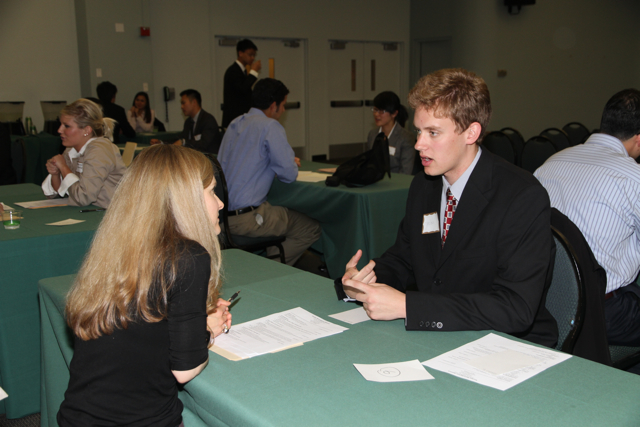
WW, a reader, asks for tips on interviewing for a job…
Hi Mark,
I recently learned about your amazing success through the Mike Dillard Self Made Man podcast (Episode 2). Coming across this episode this week was very serendipitous for me because I have the exact big opportunity that you talked about in this episode.
You said, “The way to become rich as an employee is to go to work for an entrepreneurial company that’s growing.”
A digital agency that I’ve been doing contract work for over the past three years has asked me to come on board as a team member to help grow the company and help especially with client retention.
Early talks have revealed that I would be getting a salary (~80k) plus many benefits that are important to me.
I would be employee #5, but I don’t want to just be an employee because I don’t want a hard limit on my potential income.
I have already proved to be a “valuable” employee as a contractor, and as an employee, I would on the “right side of the ledger” because I am currently involved in digital strategy for clients but will soon be involved in client retention efforts.
My question to you: What is the most important question that I should ask in my negotiation for joining this small but growing company?
A limited number of Mark Ford’s books – including those written under the pen name Michael Masterson – is available to readers of this blog at a discount. To order directly from us, see Order Information at the end of this section.
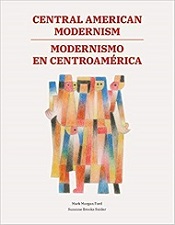 Central American Modernism
Central American ModernismIntroducing an important new book on modern art. Central American art is Latin American art. And as this book demonstrates, it is Latin American art at its greatest – worldly and sophisticated and yet also profoundly native.
Modern art in Central America shares much with the best of the modern art of Mexico and South America. But as this book – Central American Modernism / Modernismo en Centroamérica – makes clear, it has a quality that is in many cases distinctly identifiable as Central American art, and among the Central American masters, there are distinct qualities that make each of them uniquely valuable.
Central American Modernism / Modernismo en Centroamérica is a bi-lingual beau-livre. It not only tells the story of how Modernism came to each country, it demonstrates – with hundreds of photographs – the magnitude of the talent that Central America contributed to Modernism.
It took 8 years for Mark Morgan Ford and Suzanne Brooks Snider to produce this comprehensive introduction to Central American art – researching and interviewing historians, museum directors, artists and their families, collectors, and gallery owners, and then photographing works, many that have never before been seen by the public.
List Price: $250 / Your Price: $150, including free shipping in the USA
Note: Central American Modernism is not available from our Delray Beach address. To order your copy, go to Centralamericanmodernism.com and enter the discount code msave40.
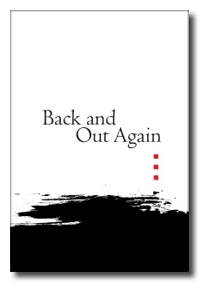
Back and Out Again is Mark Morgan Ford’s first collection of poetry – the product of a three-year challenge to write a poem a day. With a willingness to put quantity above quality, he explored dozens of established and some novel approaches to rhyme, rhythm, and form.
The subjects ranged from mythology to politics to death to the complexities of human relationships. Of the roughly thousand poems written, these are 91 of his editor’s picks.
List Price: $14.95 / Your Price: $10, including free shipping

It Is Raining, Lovely, Raining is Mark Morgan Ford’s second poetry collection. Here, the approach is introspective, with 86 crafted observations, memories, and reflections that find meaning in a moment… joy or sadness in a gesture… and humor where it’s least expected.
List Price: $14.95 / Your Price: $10, including free shipping
Sold Out!

“In poetry,” Wallace Stevens once said, “you must love the words, the ideas and the images and rhythms with all your capacity to love anything at all.” Mark Morgan Ford’s love of everything about poetry is clearly evident in his own work – in his first two poetry collections and now in Lexis in Wolf’s Clothing, his third.
List Price: $14.95 / Your Price: $10, including free shipping

“A poem is never finished, only abandoned,” said Paul Valéry, the 18th century French poet, essayist, and critic. If you’re familiar with Mark Morgan Ford’s first three collections, you’ll find second, third, even fourth iterations of poems here that he couldn’t let go of … along with much that is new.
List Price: $19.95 / Your Price: $15, including free shipping
 Dreaming of Tigers
Dreaming of TigersMark Morgan Ford has written and published dozens of books – on business, entrepreneurship, wealth building, and personal productivity – based on what he has learned as a successful entrepreneur. He has also written a book on diction, a book on literary and philosophical ideas, a book on Central American art, four screenplays, and four collections of poetry. His longest standing interest, however, has been fiction, writing stories, sporadically but continuously, since he was a teenager. Dreaming of Tigers is his first short story collection.
List Price: $19.95 / Your Price: $15, including free shipping
“Whatever you do, wherever you go, people will judge you by the way you speak.”
– Michael Masterson
Having the right words to express your thoughts clearly is a skill that everyone needs. Wherever you are on your road to success – in business or in your personal life – this book will help you take giant steps forward.
List Price: $14.95 / Your Price: $10, including free shipping

Successful people don’t sit around waiting for everything to be “100%” right or to be “absolutely sure” they will succeed. They don’t need absolute assurance, because they realize life doesn’t provide any. To get what they want out of life, they set specific goals and put together a formal plan to achieve those goals, one step at a time. Successful people know that the cost of failure is modest compared to that of inaction. Failure means they are smarter the next time. Inaction means there is no next time-there’s only a lifetime of regret.
In The Pledge: Your Master Plan for an Abundant Life, author Michael Masterson reveals how to become successful-and not just financially, but in every area of life. The book
The Pledge teaches readers how to start and finish projects they have been dreaming about for years, boost confidence, strengthen skills, build wealth, and enjoy life.
List Price: $24.95 / Your Price: $15, including free shipping
 How to Speak Intelligently About Everything That Matters
How to Speak Intelligently About Everything That MattersHow to Speak Intelligently About Everything That Matters identifies and explains important ideas you’re likely to encounter in conversations with powerful people, wealthy people, political people, social people, and—most of all—smart and interesting people.
Think of it as a “cheat sheet” to the most important ideas—ideas that can explain, elucidate, and enrich your life.
After reading the book, you will:
List Price: $35 / Your Price: $25, including free shipping
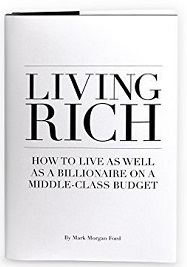 Living Rich: How To Live As Well As a Billionaire on a Middle Class Budget
Living Rich: How To Live As Well As a Billionaire on a Middle Class Budget“How much money do I really need in order to have everything I could possibly want?”
In this book, Mark Morgan Ford answers that question – and it’s a lot less than you might think.
In Part I of the book, he explores many ways to live rich on a budget, how it is possible to enjoy the best things in life for a fraction of the money that billionaires spend on the same quality products and services.
Then, in Part II, he argues that, although luxurious things comprise a part of living rich, the bigger and more important part is how you spend your time. We are all given 24 hours a day. How we fill that time determines the richness of our experience. By the time you finish the book, you’ll know exactly how to start living each of your 24 hours as richly and as freely as a billionaire.
List Price: $34.95 / Your Price: $20, including free shipping
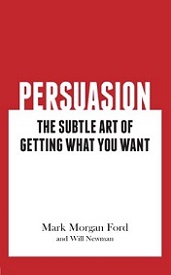 Persuasion: The Subtle Art of Getting What You Want
Persuasion: The Subtle Art of Getting What You WantWhat do you want from life?
Money? Fame? Respect?
Mastering the skill of persuasion will make all your ambitions more achievable. It will make you feel smarter and shrewder and more confident in almost every situation. You won’t have all the answers, but you will have a good idea about how to get people to embrace the answers you believe in.
Persuasion: The Subtle Art of Getting What You Want will help you master the persuasive techniques you need.
It doesn’t matter whether you are having a conversation at breakfast with a group of friends, responding to an email from your boss, chatting with a colleague on a break, writing a memo, talking to your banker about a loan, making a speech to get your candidate elected, drafting a sales letter or a letter to raise money for a favorite cause… what you learn in this book will give you the power to succeed.
List Price: $14.95 / Your Price: $10, including free shipping
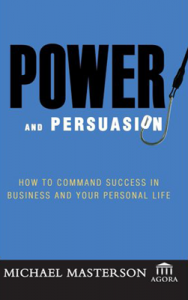
It takes a rare combination of openness and resolution, toughness and compassion, cooperation and competition to become successful in life. In Power and Persuasion, Michael Masterson challenges many of today’s popular notions about success. The leadership, personal growth, and management techniques set forth in Power and Persuasion are effective for anyone who is interested in getting on the fast track to success.
According to Masterson, publisher of the Early to Rise daily e-newsletter, truly successful people must be willing to do the hard thinking, make the tough decisions, and get the job done. They must seek the help of the best people available, without shirking their individual responsibility, to create a compelling vision of what can be and then sell that vision to their employees, their investors, and their customers. Knowing how persuade others that your ideas are worthy is the single most effective way to achieve power. And putting lots of power behind your best ideas, Masterson says, is the fastest and surest way to succeed in life.
The good news is that persuasion, like so many other important skills (communication, negotiation, and analytical thinking), can be learned. In Power and Persuasion, you’ll discover how to develop great ideas and convince other people to value them.
Based on his own experience as a successful businessman and his observations of other, Power and Persuasion will help you identify the essential qualities needed to be successful in your business, social, and personal life. This powerful guide will also show you how to become a more influential person through example and by practicing the most effective techniques of persuasion.
Power and Persuasion breaks new ground in decoding what it takes to be successful by providing examples of leaders who…
Filled with in-depth insight and expert advice, Power and Persuasion introduces a new way of understanding success along with powerful and proven techniques for accomplishing everything you want to in life.
List Price: $24.95 / Your Price: $15, including free shipping
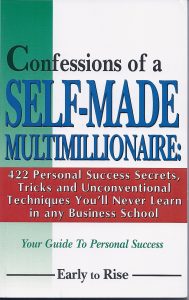 Confessions of a Self-Made Multimillionaire
Confessions of a Self-Made Multimillionaire422 Personal Success Secrets, Tricks, and Unconventional Techniques You’ll Never Learn in Any Business School (Your Guide to Personal Success)
When you follow the advice in Michael Masterson’s Confessions of a Self-Made Multimillionaire, it can make the difference…Between retiring with just enough to get by…or with a millionaire’s portfolio…Between having a job you dread going to every day….or the job you’ve always dreamed about…Between going through the motions, keeping up with the Joneses, and wondering every day if this is all there is… or doing the things that would make your life rich and meaningful…
Between living the life you’re living today…and living the life of those leaders and achievers you envy. Michael’s ideas are far more useful and practical than most of what you see in the “self-help” or “business-advice” markets. His advice is powerful because it comes from his own experience…in the trenches, in the board room, and everywhere in between….
When you use the secrets in Confessions of a Self-Made Multimillionaire, for your business, your product, your service — or yourself — you will reap life-changing rewards.
List Price: $14.95 / Your Price: $10, including free shipping Sold Out!
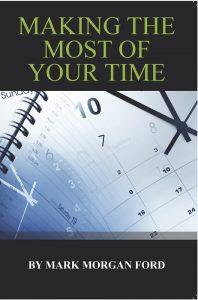 Making the Most of Your Time
Making the Most of Your TimeYou are setting goals and creating task lists. But there’s a problem. Those tasks rarely get done, pushing the achievement of your goals further and further away.
In Making the Most of Your Time, Mark Ford divulges…
• How to nail-down your long-term goals
• What 80% of people are doing wrong that causes them to fail
• A trick to quadrupling your productivity
• A simple way to add an extra two productive hours to your day
• And much more
List Price: $9.95 / Your Price: $7, including free shipping
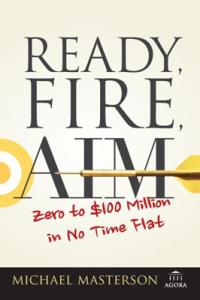
Whether you’re thinking about starting a new business or growing an existing one, Ready, Fire, Aim has what you need to succeed in your entrepreneurial endeavors.
In it, self-made multimillionaire and bestselling author Masterson shares the knowledge he has gained from creating and expanding numerous businesses and outlines a focused strategy for guiding a small business through the four stages of entrepreneurial growth. Along the way, Masterson teaches you the different skills needed in order to excel in this dynamic environment.
List Price $27.95 / Your Price: $15, including free shipping
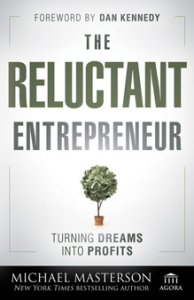
A comprehensive guide for entrepreneurs from one of the most successful business creators in recent years, The Reluctant Entrepreneur: Turning Dreams into Profits addresses the fears and misconceptions that many people have about starting their own businesses, walking prospective owners through the necessary decisions they need to make before even putting a business plan in place.
Presenting solid, reliable strategies based on author Michael Masterson’s own successful practices, and debunking some common illusions entrepreneurs have about their businesses, the book is a vital resource for anyone looking to avoid the pitfalls that threaten fledgling companies.
Essential reading for small business owners and both first time and established entrepreneurs, The Reluctant Entrepreneur presents the smart strategies on starting and growing a small business that can make launching your own company a cinch.
List Price: $24.95 / Your Price: $15, including free shipping
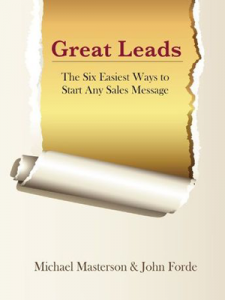
This is how Michael Masterson and John Forde begin their groundbreaking book Great Leads: The Six Easiest Ways to Start Any Sales Message.
But, the title doesn’t tell the whole story. Yes, the book is about how you can ratchet up your copywriting by learning the six distinct types of leads and how to write and use them effectively.
But just as important, the book reveals three strategies few copywriters know or understand that you can start using immediately to:
Here are just some of the secrets and strategies you’ll learn in Great Leads …
These are just a few of the secrets, strategies, and insights you’ll learn in Great Leads: The Six Easiest Ways to Start Any Sales Message.
List Price: $14.95 / Your Price: $10, including free shipping
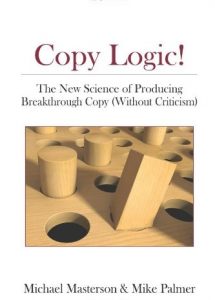
Copy Logic! The New Science of Producing Breakthrough Copy (Without Criticism), written by Michael Masterson and Mike Palmer, will help you write strong, well-balanced copy every single time.
It has the potential to transform you from the copywriter you are today to the copywriter you’ve always wanted to be.
And … if you’re already earning a living as a copywriter (at any level), this e-book will show you how to write stronger copy, write it faster and submit your final package with much more confidence. In short: you’ll be able to earn more for your writing … lots more.
Take a look at some of the secrets included in Copy Logic! …
Of course, there’s even more you’ll uncover once you sit down with this easy-to-read e-book (just a suggestion – you may want to have your highlighter and notebook at your side because you’ll have some real “A-ha” moments while reading).
List Price: $14.95 / Your Price: $10, including free shipping Sold Out!
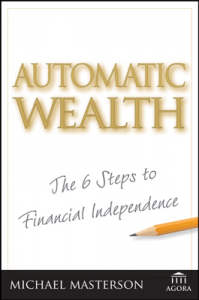
If you’re worried about getting burned by financial programs that promise you’ll get rich quick—through unlikely stock tips or high-risk trading strategies—and don’t have the patience to invest in a savings plan that takes thirty or forty years to take advantage of the “miracle of compound interest,” then you’ve picked up the right book.
In Automatic Wealth, self-made millionaire Michael Masterson draws upon his own experience and that of experts in the fields of retirement, investing, and real estate to offer you a complete program on achieving financial independence. Organized around six key principles, Automatic Wealth will show you how to develop your wealth- building skills and habits and turn yourself into an “automatic wealth-builder.”
The proven program detailed throughout this book—one which incorporates nothing but strategies that have personally worked for Masterson as well as the people he’s mentored—is broken down into six easy steps:
Automatic Wealth follows a well-conceived plan that focuses on building income and equity simultaneously. Filled with in-depth insight and practical advice, this unique guide offers specific steps—including how to develop wealth-building habits now and how to develop a three- to fifteen-year plan to reach millionaire status—that will help you live a more fulfilling financial life.
List Price: $24.95 / Your Price: $15, including free shipping
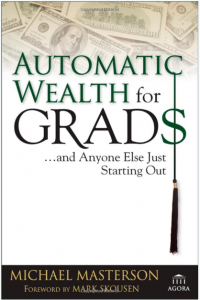 Automatic Wealth for Grads
Automatic Wealth for GradsAutomatic Wealth for Grads is like getting your master’s in financial independence—but without the midterms and textbooks. Filled with real-life examples and practical advice, this single book will teach you the secrets to getting wealthy sooner than you ever imagined . . . for many, even before the age of thirty.
Most grads discover pretty quickly that making a lot of money is not as easy as depicted in movies or on infomercials. Getting wealthy is a serious business that requires ambition, intelligent choices, and follow-through. The good news is that it doesn’t matter whether you majored in English or economics, you can use these “money tested” techniques to make wealth-building not only probable but automatic. And when your cash flow balloons, you’ll have more time, energy, and peace of mind to enjoy the things that really matter to you—whether it’s traveling to Italy, playing the guitar, or just hanging out with friends and family.
In Automatic Wealth for Grads, self-made multimillionaire Michael Masterson becomes your personal mentor, drawing upon his own experiences and those of experts in the fields of investing, real estate, and business to offer you a complete program for achieving financial independence in record time. Organized around proven wealth-creating principles, he will show you how to quickly master the powerful moneymaking skills that will transform you into a dynamic, automatic wealth-builder, no matter what career path you choose.
The best part is that you don’t need a fortune—or anything in the bank—to get started right now, whether it’s finding a high-paying job, getting a huge raise, or even investing in real estate.
List Price: $22.95 / Your Price: $15, including free shipping Sold Out!
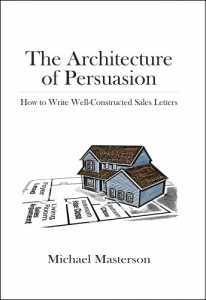
From the ancient Egyptians writing on papyrus to Internet advertisers today, writing powerful sales letters has been a critical skill in developing successful businesses.
In the Architecture of Persuasion, Michael Masterson helps you master this skill. And by using the extended metaphor of an Indiana Jones-style professor on a quest for romance, he makes it fun.
You follow the professor as he catches the eye of the object of his affections… figures out what to say and do to get her to fall in love with him… and, step by step, lays the groundwork for the establishment of a mutually beneficial, long-term relationship. In the process, you learn how to construct a powerful sales letter.
With Architecture of Persuasion, you’ll:
List Price: $14.95 / Your Price: $10, including free shipping Sold Out!
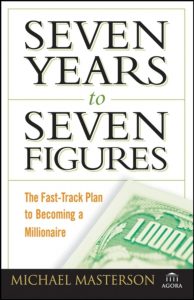
“Most popular books on money stress frugality and long-term savings,” observes Michael Masterson, bestselling author of Automatic Wealth and Power and Persuasion. “But most people don’t like to scrimp. And almost nobody is willing to wait forty years for compound interest to work its wonders.”
And that’s exactly why Masterson created Seven Years to Seven Figures: The Fast-Track Plan to Becoming a Millionaire. It’s the perfect book on getting rich for baby boomers who can’t wait long and younger people who just don’t want to.
Why seven years? Admittedly, when Masterson began working on the concept of accelerated wealth, he thought it might be unrealistic. But when he looked at how long it actually took him to make each of the million-dollar fortunes he’s earned, he realized that none of them took longer than seven years. And the same turned out to be true for many other millionaires he knew.
In Seven Years to Seven Figures, this self-made millionaire and renowned wealth coach reveals the steps everyone can take to accumulate seven-figure wealth within seven years—or less. In it you’ll find real-life stories of men and women who built (and even exceeded) a seven-figure net worth within this time frame. Masterson describes their paths to success and explains, step by step, how you can mirror their wealth-building techniques, including:
If you’re willing to get up earlier, work harder, and start a business, Seven Years to Seven Figures will give you the tools to increase your income, get the highest possible returns, save wisely—and secure your financial future faster than you may have dreamed.
Remember, some of the people profiled in this book built up a seven-figure net worth after leaving low paying jobs, after struggling with credit card debt, even after filing for bankruptcy. If they can go from zero to millions in seven years or less, you can too.
List Price: $24.95 / Your Price: $15, including free shipping
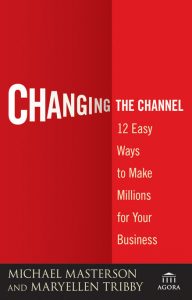
An all-encompassing guide to making the most from multi-channel marketing.
Written in a straightforward and accessible style, Changing the Channel offers you a detailed look at twelve of today’s most important marketing channels-explaining how each one works individually as well as in conjunction with each other, leveraging the power of your message for explosive profits.
Page by page, you’ll become familiar with a variety of approaches, including direct online marketing, social media, public relations, radio and television advertising, direct space ads, event marketing, telesales, telemarketing, joint ventures, affiliate marketing, and direct mail.
With this book as your guide, you’ll quickly discover how marketing across multiple channels can help develop quality customer relationships and improve the bottom line of your business.
List Price: $24.95 / Your Price: $15, including free shipping Sold Out!
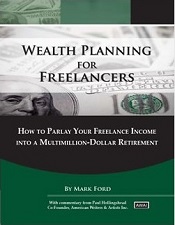 Wealth Planning for Freelancers: How to Parlay Your Freelance Income into a Multimillion-Dollar Retirement
Wealth Planning for Freelancers: How to Parlay Your Freelance Income into a Multimillion-Dollar RetirementFreelancing gives you a world of opportunity. You are free from the 9-to-5 grind, which leaves you plenty of time to spend with your family and friends – not to mention the potential to make an incredible amount of money.
So what are you going to do with all that money? In Wealth Planning for Freelancers, Mark Morgan Ford outlines a plan for making it work for you to secure your future.
List Price: $9.95 / Your Price: $7, including free shipping
To order Mark Ford’s books directly from us…
* Send a check to cover the discounted price of the book(s) you are ordering.
* Make the check payable to Cap & Bells Press, LLC. (No cash, please.)
* Include your name and mailing address and mail it to:
Cap & Bells Press
Attn: GKoo
290 SE 2nd Ave.
Delray Beach, FL 33444
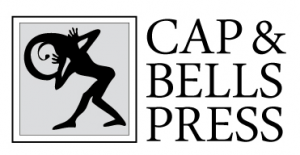
Cap & Bells Press is a boutique publishing company that focuses on contemporary fiction, nonfiction, poetry, and art. Launched in 2012, it is our mission to be a vehicle for undiscovered writers.